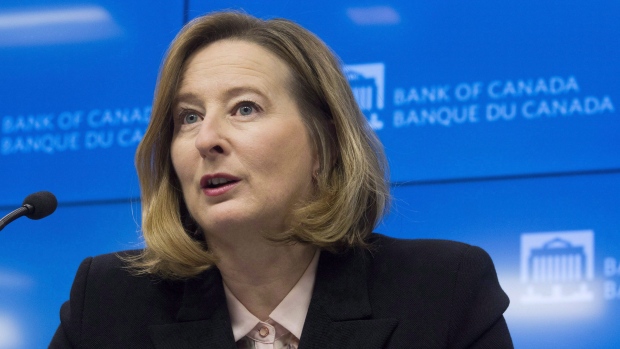Feb 8, 2018
Household debt weighing on economy, NAFTA clouding outlook: Bank of Canada's Wilkins
Reuters

Canada's high household debt is the biggest vulnerability facing the economy, while uncertainty about NAFTA is weighing on the outlook, but the Bank of Canada is factoring in the economy's overall performance as it makes its next rate decision, Senior Deputy Governor Carolyn Wilkins said on Thursday.
While some households will find it extremely difficult to cope with higher debt service costs, the central bank expects both the economy and consumption to keep growing, Wilkins said in an interview with Reuters.
"Every household is going to find it more or less difficult, so some households might find it extremely difficult, others will just need to tighten their belt a bit, but overall as you can see from our projection, we expect the economy to continue to grow, we expect consumption to continue to grow."
The bank has raised rates three times since July by a total of 75 basis points and markets expect more tightening this year.
"I think we are being very clear that the biggest vulnerability to the Canadian economy is coming from household indebtedness, high household indebtedness," Wilkins said on the sidelines of a G7 symposium.
"And we've also been very clear that ... uncertainty around how NAFTA will turn out is a major source of uncertainty facing businesses, and Canadians in general, that is weighing on the outlook. We do factor those things in. We also factor in the rest of the economy and how it is performing."
Canada, the United States and Mexico are in talks to modernize the North American Free Trade Agreement. U.S. President Donald Trump has threatened to walk away from the 1994 pact, which he has called a bad deal that hurts U.S. workers.
'NOT THE STRONGEST START'
Wilkins declined to give "a running commentary" on recent economic data, but said GDP growth had shown the quarter got off to "not the strongest start" but remained in line with forecasts.
"When we look at policy, we also take into account some of the factors that we say we are monitoring, including potential output. Governor (Stephen) Poloz has said many times there is in an upcycle often more potential being built as demand strengthens than economists tend to put in their projection," she said.
Asked whether the recent stock market selloff would affect the bank's path to higher interest rates, Wilkins said asset prices fed through the transmission mechanism and forecasts but only mattered if moves were large and in one direction.
The more important context is that the stock market volatility is happening in an environment of growth and rising bond yields, she said.
"So if you see a context where the economy is strengthening and because of that bond yields are rising, then you would expect adjustments in portfolios," she said.
Canada's main stock index fell on Thursday to its lowest level in nearly five months as a selloff on Wall Street deepened.
While policymakers pay attention to how the markets are pricing in odds for future rate hikes because it gives them insight into what markets expect the bank to do, it is not a source of concern, Wilkins said.
"We find that information very valuable and we also look at it just to see what they expect us to do ... but what markets are expecting or not expecting is rarely a source of concern. Our biggest concern is taking the right decisions to achieve our inflation target," Wilkins said.